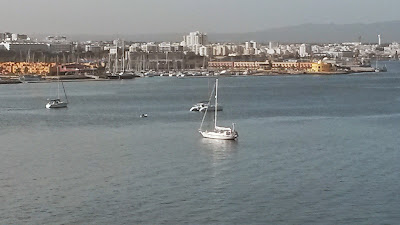The crossing from Morocco back to Gibraltar had been a challenge. Thick fog obscured the very busy shipping lanes that we were crossing. The forecast 15kt wind decided to be 18-20+kts. This pushed the sea into a confused wind against tide, and the waves just grew bigger. To add to the difficulties the Raymarine chartplotter and radar, in the cockpit, decided to choose that moment to pack-up.
Back in Gib, no help was found, but with the main plotter at the chart table working OK, we set off for Madeira.
Again the weather gods had us in their sites. Blue sky, sunshine, a perfect NE 10knots sent us on our way. Six miles later it was blowing 18kts – great sailing!
By the time we reached Tarifa, ten miles further on, the wind and seas had built. Now it was no main, and no jib – just a small staysail. We surfed the 4m waves at over 9kts in 38kts of wind, and darkness was approaching.
The winds eased a little, so did the sea. Talking to other yachts spread from Gib to Tenerife, to Madeira on the long range radio (SSB), we heard that everyone was enjoying fast sailing. The good news was; the further west you got, the more the wind and seas dropped.
Two days later, nearly half way to Madeira, the chartplotters’ threw all their toys out of the pram. No longer would they maintain their displays. The choices: Return to Gib 200 miles up wind? Carry on out into the Atlantic for Madeira, another 250 miles down wind? Tack for the Algarve 120 miles across the wind to the north? I tacked.
Twenty-four hours later, just as dawn broke, we entered the river at Portimao. Anchor down, head down, and a good sleep.
.jpg)
The anchorage was pretty, and very secure. Golden cliffs and sandy beaches surrounded us. And the sun shone. In town, the high-rise blocks encircled the old town with its quaint little parks. It was a pleasure to while away the minutes sitting on tiled seating, to enjoy the flower beds, the mosaic pavement, and the sun-drenched trees wrapped in crocheted artwork.
.jpg)
.jpg)
Always a trading port from early Phoenician, then Roman times, Portimao again came to prominence in the early days of the slave-trade, then later, building perhaps the largest sardine fishing and canning industry in Portugal. Now its tourism.
.jpg)
Back on the boat, enquiries had revealed that repairs were possible here, but not speaking Portuguese was a handicap, so we sailed across the bay to Lagos. Contacts in the Ocean Cruising Club soon unearthed some help. So now we wait, fingers crossed, that all will be repaired, and we can resume our travels.

Today it rained!


.jpg)
.jpg)
.jpg)
.jpg)
.jpg)
.jpg)
.jpg)
.jpg)
.jpg)
.jpg)
.jpg)
.jpg)
.jpg)
.jpg)
.jpg)

